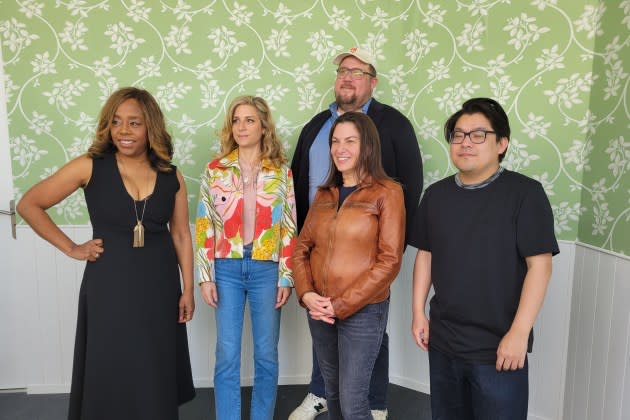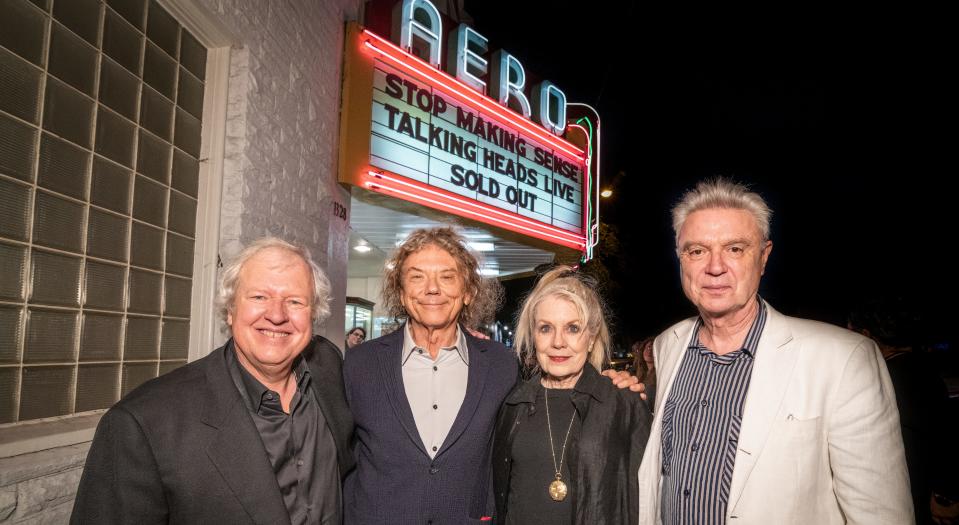U.S. Documentary Filmmakers And Execs Shake Off The Post-Boom Gloom & Ponder Life After The Golden Age — Cannes

Being away from home allows room for perspective, and for a group of U.S.-based documentary experts who made the trip to Cannes, the glass remains half full, despite the headwinds. The closure of Participant, Showtime Docs, CNN Films scaling back and belt-tightening across the board have led many to posit that a Golden Age of documentary films has ended. A discussion in the American Pavilion at the Cannes Film Festival begged the question: If the Golden Age is over, what comes next?
For the assembled speakers, there was an acceptance of the challenges, but also a desire to take a long view and to look to the future.
More from Deadline
“With the market retracting and some distribution outlets not being replaced by others, we’re forced to be creative again about how we get these films out to market, how we find audiences,” said Cinetic Media’s Jason Ishikawa during the Deadline-hosted panel.
Imagine was in Cannes with the Ron Howard-helmed Jim Henson Idea Man, about the eponymous creator of The Muppets. Imagine Documentaries President, Sara Bernstein, agreed that the perfect storm the docs industry has weathered means there will be a rethink in terms of financing.
“At Imagine we’re starting to finance or co-finance more of our projects from the start,” she said. “I think it’s about how do you get those projects started? And I think with the success of documentaries there is a new generation of investors who are interested. And then you can bring them back to a Netflix or an HBO Max or a Frontline, or the theatrical distributors who are still putting documentaries out there.”

Nanette Burstein also premiered a film at Cannes, Elizabeth Taylor: The Lost Tapes, which Deadline reviewer Pete Hammond called a “a satisfying journey through one of Hollywood’s most memorable careers.” Burstein opined that in straitened times in media, the numbers could start to work in favor of docs: “What I don’t think is going to happen is that nonfiction is going to be sidelined. If anything, I think it should be embraced because you have so much interest and so many eyeballs, and it costs a fraction of the price of scripted.”
Doors Close, Doors Open?
The panel comprised U.S.-based docs makers and execs, who don’t have access to the same kinds of government, pubcaster, and industry support as their European counterparts. That is not to say they can’t work with their continental cousins. “I think we’re seeing a lot more of going back to the kind of old European coproduction model where you might get six or seven broadcasters on board and save maybe North America for upside,” said Matt Burke, VP of Sales at Submarine.
For the filmmakers on the panel, it was really a case of ‘twas ever thus. Deborah Riley Draper, the filmmaker behind A+E series James Brown: Say It Loud said some doors are closing but that doesn’t mean others aren’t opening. “Maybe it’s about different doors,” she said. “Maybe it’s not going through the theatrical doors. Maybe we just need to go through different ones: museums doors, college campuses, impact campaigns, and create a whole new world for selling documentary.
“Trust me, I love to have a big crowd for a movie, and have a Q&A after, it’s the most wonderful thing for any filmmaker. But we’re also entrepreneurs, so we have to figure out where the audience is, who the audience is… we might have to come to them in some different ways.”
The current moment of introspection about the future of the doc films sector is also about what is getting made. In a troubled world, many are questioning, where is the space for political and social films and filmmakers? The like of Ava DuVernay asked as much in an open letter to the industry after Participant shuttered. Crime, sports, and celebrity dominate the inventories of the streamers, and often, in the latter category, spawn films in which the subjects wield an outsize level of editorial influence.
The lineup in this year’s Best Documentary Oscar category, won by 20 Days In Mariupol, however, gave a glimmer of hope. “Social films find their way. I just think it’s getting harder to find the biggest distribution for them at this point, but I thought that was very telling,” said Imagine’s Bernstein.
Theatrical Staying Power
A conversation playing out against the backdrop of the Cannes Film Festival was always going to cover where a theatrical release fits into the equation. “That dimension is not replaceable with any other distribution, for sure, and it creates a longer life for these movies,” said Cinetic’s Ishikawa. “A lot of nonfiction needs that… we need that watercooler effect because we don’t have billboards.”

Streamers are increasingly mindful that a theatrical release extends the appeal of a film and bakes in word of mouth. “It’s become much easier to build in those windows,” said Submarine’s Burke. “On the licensing side, where a lot of streamers previously didn’t care if it had any theatrical distribution, now that’s helping to get a deal done. We say we’re going to do a small release in five or 10 markets and it’s gonna have a profile and some marketing prior to it getting onto Netflix or Hulu or whatever – it’s helping to get those deals.”
One thing feature docs do have is staying power. Ishikawa said his company has realized “the story’s not done” with older titles, noting the box office success of vintage Talking Heads concert film Stop Making Sense, acquired and restored by A24.
“A24 did not exist when that came out [in 1984] and was able to reintroduce it to a whole new audience,” Ishikawa said. “It’s insightful in terms of the long game. A lot of times we’re playing the short game: selling the movie, getting it out there, and then moving on to the next one. But for a lot of documentaries the process continues and these films could live forever, hypothetically. They could reach a whole new audience. We’re seeing that process play out and seeing a desire from other distributors when we’re looking at our library.”

Indie Financing And Festival Frenzy
Some filmmakers Deadline spoke with outside the panel joked that the Golden Age would have been more accurately labeled a Golden Moment. Speaking to an industry crowd, the AmPav panelists agreed that amid talk of golden ages and the current handwringing, a long view helped.
“There are far more viewers for documentaries now than there were 10 years ago, five years ago, or ever,” Burke said. “Ultimately, that’s only going to continue to grow. While something might sell for more money next year than it would this year, there’s still a bigger audience and more appetite and more specific audiences to consume films from all sorts of different types of creators.”
If streamers underwrite less of the cost and independents and new funders pick up a larger chunk of the budget and the risk — even though that is mostly out of necessity rather than choice — it could also bolster the festival cred and buzz for docs, the Cannes audience was told.
Imagine’s Bernstein said: “If more projects are being independently financed then what you will see is when they premiere at festivals like Cannes, like Sundance, like Toronto, there will be a bigger frenzy around those projects, which will hopefully drive up the value and the sales of these projects again.”
Best of Deadline
Hollywood & Media Deaths In 2024: Photo Gallery & Obituaries
TV Cancellations Photo Gallery: Series Ending In 2024 & Beyond
2024 Premiere Dates For New & Returning Series On Broadcast, Cable & Streaming
Sign up for Deadline's Newsletter. For the latest news, follow us on Facebook, Twitter, and Instagram.

 Yahoo Lifestyle
Yahoo Lifestyle 
